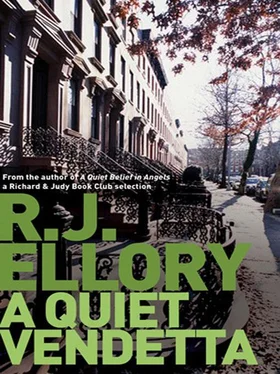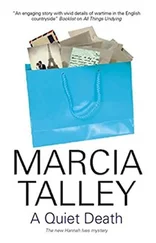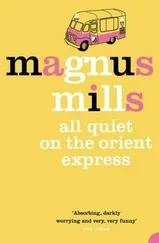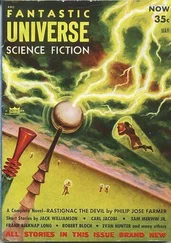Verlaine, perhaps for no other reason than to kill a little time, took the long route. Back of the French business quarter, along North Claiborne on St Louis and Basin. Here was Faubourg Treme, city of the dead. There were two cemeteries, both of them called St Louis, but the one in the French Quarter was the oldest, the first and original burial ground dating back to 1796. Here were the dead of New Orleans – the whites, the blacks, the Creoles, the French, the Spanish, the free – because they all wound up here, every sad and sorry one of them. Death held no prejudice, it seemed. The graves did not reveal their color, their dreams, their fears, their hopes; gave merely their names, when they arrived and when they departed. Crosses of St Augustine, St Jude, St Francis of Assisi, patron saint of travelers who loved nature, who founded the Franciscans, who begged for his meals and died a pauper. And on the other side were the believers, the gris-gris crosses marking their passage into the underworld. Voodoo Queen Marie Laveau, R.I.P. Haitian cathedrals of the soul.
He reached Barrera at Canal by the Trade Mart Observation Tower, asked himself why he was driving so far out of his way, shrugged the question away. He was now ahead of the French Market beyond Vieux Carre Riverview. A good couple of miles of warehouses interspersed with clam joints, jazz clubs, bars, restaurants, diners, sex shops, a movie theater and the landing jetties for the many harbor tours. Despite the heat the streets down there were busy. Groups of Creoles and blacks stood aimlessly at corners and intersections, hurling arrogant and playful remarks at passing women, flying the finger at compadres and amigos, drinking, laughing, talking big, oh so very big, in this smallness of life. Daily you could find them, nothing better to do, persuading themselves that this was the good life, the life to live, where things were easy come easy go, where everyone who wasn’t there was a jerkoff, a dumbjohn, a turkey; where the duchesses sailed by, their hands on the arms of trade, making their way to some seedy Maison Joie down the street and back of the next block, and these corner-hugging, street-smart hopefuls were wise to their act and knew not to say anything whatever the trade looked like, for a duchess with a stiletto heel to your throat was no cool scene. Here, the air was haunted forever with the smell of fish, of sweat, of cheap cigar smoke passing itself off as hand-rolled Partageses; here existence seemed to roll itself out endlessly from one dark and humid dream to the next, with no change to spare but daylight in between. Daylight was for scoring, for counting money, for sleeping some, for drinking a little to prep the tongue for the onslaught that would come later. Daylight was something God made so life was not one endless party; something, perhaps, to give the neon tube signs a rest. Places such as this they held cock fights; places such as this the police let them. In the guidebooks it suggested you visit these parts only in groups, directed by an official, never alone.
Verlaine crossed the junction of Jackson and Tchoupitoulas where the bridge spanned the river and joined 23, where 23 crossed the West Bank Expressway, where the world seemed to end and yet somehow begin again with different colors, different sounds, different senses.
He arrived unnoticed at the Precinct House – the place was almost deserted – and checked status on the prints. They had nothing yet, perhaps wouldn’t until someone pulled their finger out Monday morning and got the hell on with what they were paid to do.
It was gone five, the afternoon tailing away into a cooler early evening, and for a little while Verlaine sat at the desk in his office looking out southwards to the Federal Courts and Office complex back of Lafayette Square. Beneath him the street slowly emptied of traffic, and then filled once more with the hubbub of pedestrians making their slow-motion way to Maylies Restaurant, over to Le Pavilion, life traveling onwards in its own curious and inimitable way. A man had been butchered, a brutal and sadistic termination, his savaged corpse parked in a beautiful car in an alleyway down off of Gravier. They were all fascinated, horrified, disgusted, and yet each of them could turn and walk away, take dinner, see the theater, meet their friends and talk of small inconsequentialities that possessed their attention to a far greater degree. And then there were others, among whom Verlaine counted himself and Emerson and Cipliano, perhaps themselves as crazy as the perpetrators, given that their involvement in life was limited to tracing and finding and sharing their breath with these people – the sick, the demented, the sociopathic, the disturbed. Someone somewhere had taken a man, hammered in his head, bound his hands behind his back, opened his chest, cut away his heart, driven him into town and left him. Alone. That someone was somewhere, perhaps avoiding eyes, avoiding confrontations; perhaps hiding somewhere in the bayous and everglades, out past the limits of Chalmette and the Gulf Outlet Canal where the law walked carefully, if at all.
Verlaine, already weary, took a legal pad, balanced it across his knee and jotted down what he knew. The time of death, a few facts regarding the condition of the vic, the name of the car. He drew the constellation of Gemini as best as he could recall, and then stared at it for some time, thinking nothing very much at all. He left the pad there on the desk and called it a day. He drove home. He watched TV for a little while. Then he rose and showered, and when he was done he sat in a chair by the window of his bedroom dressed in a robe.
The warmth of the day, the way his mind had been stretched by its events, took its toll. A little after ten Verlaine lay on his bed. He drifted for a while, the window wide, the sounds and smells of New Orleans drifting back into the room with the faintest of breezes.
You had to live here to understand, you had to stand there in Lafayette, out in Toulouse Wharf, there in the French Market as you were jostled and shoved aside, as the ripe odor of humanity and the rich sounds of its brutal rhythms swarmed right through you…
You had to do these things to understand. This was the Big Easy, the Big Heartacher. New Orleans, where they buried the dead overground, where the guidebooks recommended you walk in groups, where everything slid over-easy, sunny-side down, where the Big George fell on eagles nine times out of ten.
This was the heart of it, the American Dream, and dreams never really changed, they just became faded and forgotten in the manic slow-motion slide of time.
Sometimes, out there, it was easier to choke than to breathe.
Morning of Monday twenty-fifth. Verlaine woke with a head like a bruised watermelon. The sun had broken early and already his bedroom was like a sauna, the feeling in the air that here was a further reprise of the vicious summer New Orleans had somehow endured.
He rose, showered and shaved; he listened to KLMZ-Heavy Jazz out of Baton Rouge playing ‘Mama Roux’ and ‘Jump Sturdy’ by Dr John. Breakfast was two raw eggs whisked into a glass of milk, two cigarettes, half a cup of coffee. He was out by nine, back to Cipliano’s office by nine-forty, and already the traffic was choking up the atmosphere with its own inimitable brand of filth.
‘The heart,’ was the first thing the coroner said as Verlaine walked through the door. Cipliano spoke through a mouthful of something or other. He went through phases of chewing on things, had given up smoking some years back but never lost the need to have something in his mouth – licorice root, chewing gum, a toothpick, whatever.
‘This trip with the heart. Kept me awake last night. I come in this morning I got a leaper John, a fucking leaper waiting for me like I got nothin’ better to be doin’ with my day. Keeping me busy these bastards are, but what can you do, eh? Anyway the leaper can wait. Like I said, this whole routine with the heart is bugging the shit outta me. Used to be the case some years back, not so much now, but used to be that the families out here, the distillery and bootlegging families you know? They would hold their vendettas as close as their liquor. Tight families, inbred, screwed each other, their own kids and sisters, Christ knows what, little ’uns all ended up looking the same, always ugly, in features and temperament.
Читать дальше







![Quiet Billie - Don't mistake the enemy [СИ]](/books/421973/quiet-billie-don-t-mistake-the-enemy-si-thumb.webp)




